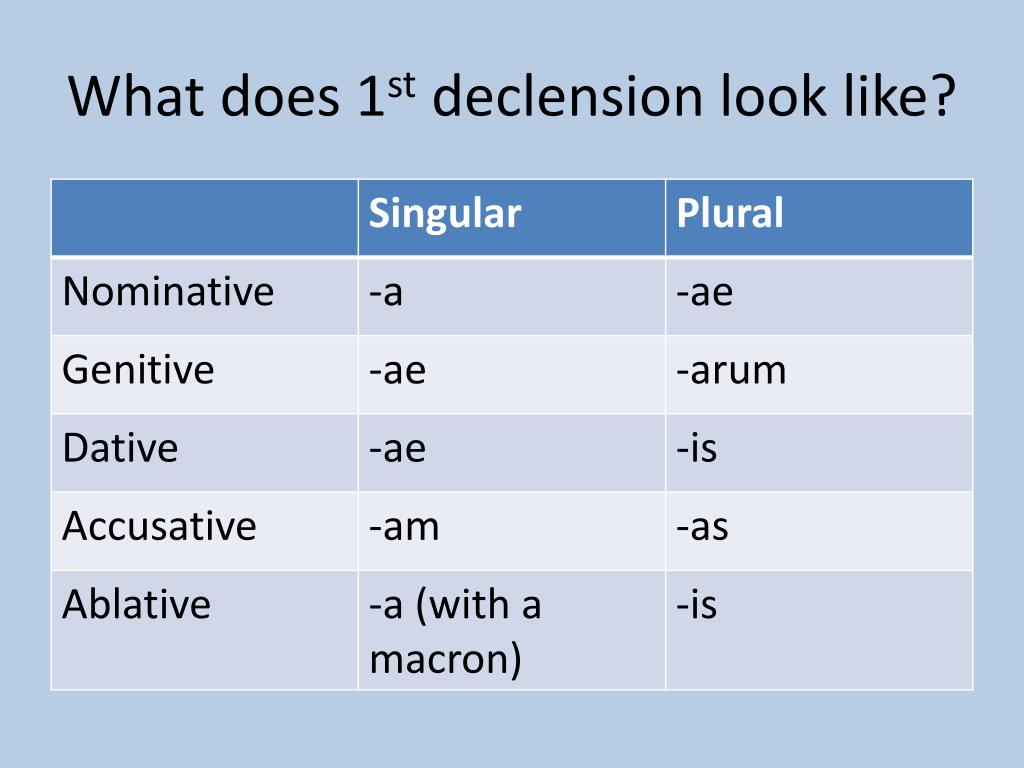

You've already seen the word laus (praise) in the case laude (ablative).

For us, these will be just special cases of the third declension, as they really are. Some people assert that the letter "u" gives the fourth declension, and "e" the fifth, but this is superfluous for our purposes. The other 21 letters give you the third declension, which gives an idea of its importance. The "o" was absorbed by the endings except in things like puero or puerorum. The second was sponsored by the letter "o," which was not. With a construction like "A of B" (e.g., "a box of tapes"), treat A as the subject not B.The first declension was brought to you by the letter "a," which was usually visible.Don't put apostrophes in possessive pronouns (e.g., "her's ,""your's ," "their's ").Don't confuse possessive determiners (e.g., "its,""your," "their") with similar looking contractions (e.g., "it's,""you're," "they're").Don't misplace your possessive apostrophe.The genitive case is so important, it is often called the "second case" (after the nominative case).įor those of you not learning a foreign language, here are some links to pages that will help you to combat some common errors that are associated with the genitive case: If you're learning a foreign language that features the genitive case, then you must get to grips with it quickly. Here are the endings of German nouns in the genitive case.Įxamples (the word, the genitive, the plural) So, looking at the table above for the definite article and the dictionary entry for "der Bruder," "der Bruder" becomes "des Bruders" in the genitive case. In German, masculine and neuter nouns take the ending "-s" or "-es." Feminine nouns have no ending. In German, the genitive case is so important that most German dictionaries show the genitive form as well as the plural form of every entry for a noun. In other languages (again, most obviously German and Russian), nouns in the genitive case change too (i.e., it's not just the adjectives and articles). Here is how they change in German in the genitive case: In English, the definite articles and the indefinite articles do not change in the oblique cases. If that's you, then here's a list of prepositions that take the genitive case in German: If you're looking up the genitive case here on Grammar Monster, then there's a fair chance you're learning a foreign language (probably either German or Russian). Genitive Adjectives and Pronouns Possessive determiners (called possessive adjectives in traditional grammar) and possessive personal pronouns are also forms of the genitive case. (The phrase "by Picasso" is not the genitive case, even though it is an expansion of something which is. There are no issues with the two examples above. Look at these examples (genitive case shaded): (We judge this to be the correct version. (Sometimes, the title "Childrens Minister" is written without an apostrophe to make it clear it is a minister for children.) However, you might also encounter writers who make a more marked distinction between the two. It is worth reiterating that the two terms are interchangeable. Some would argue this is the genitive case and not the possessive case.) For this reason, some argue this is the genitive case and not the possessive case.) (No one would argue this is the genitive case and the possessive case. However, as this case does not always show possession, some grammarians like to make a distinction between the genitive case and the possessive case. The "genitive case" is also called the "possessive case." The two terms are interchangeable, but "possessive case" is more common in English study. Read more about using an apostrophe to show possession. There are several other ways of forming the genitive case using an apostrophe: Here are some examples of the genitive case: In English, you will often hear the term "possessive case" in place of "genitive case," but be aware that the genitive case is not always about possession (more below). Most people will encounter the term "genitive case" when studying a language other than English. Prepositions That Take the Genitive Case.


 0 kommentar(er)
0 kommentar(er)
